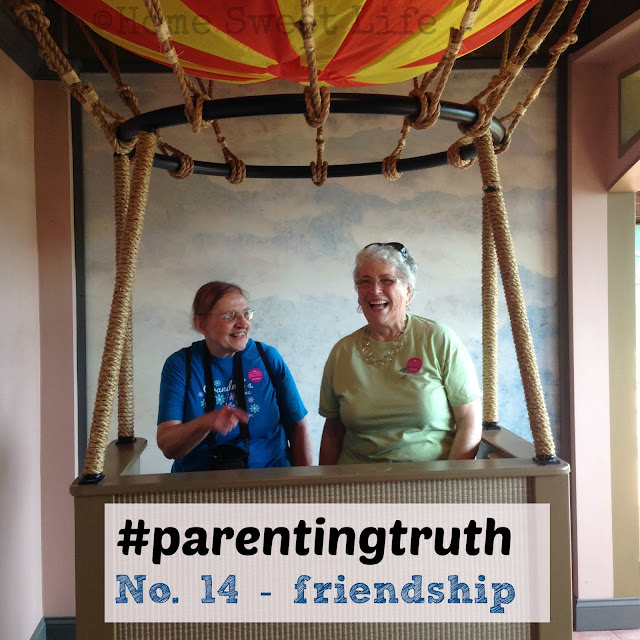Thursday, April 18, 2019
#parentingtruth No. 14 - Evolving Friendships
This is a picture of my Mom and her friend Suzanne. They have been friends since they were college roommates over 50 years ago. What kind of friendship lets you laugh and have fun for decades? The kind we want to teach our children to have: honest, forgiving, long-lasting ones!
Today's #parentingtruth brought to you by the only thing besides God that is constant: change.
Our own friendships evolve and we cannot expect our children's friendships to be any different.
There seem to be four key stages children go through as they learn about friendship. Some of them only go through the stages once or twice, others seem to go through them every year. The stages are:
1- learning to be friends
2- everybody is my friend
3- no one is my friend
4- holding fast and letting go
These seem like a natural progression for us as adults, but our children need us to walk with them through the stages, because every friendship is a new experience for them.
Learning to be friends
Let's face it, teaching our children how to be a friend is a lot like teaching them how to share. There is no short cut, and you have to make them do it at first as you model the steps for them. Walk over to that person, introduce yourself, ask them their name, ask if they would like to play a game with you, or play with your ball. It can be a lot of hard work, and I think this is where parents often recognize the differences between their multiple children. No two children approach making friends the same exact way, so be patient.
Everybody is my friend
Here is where the elementary years are so fun, and often confusing to you as a mom or dad. Your child has gotten a taste of the fun hey can have in a group setting and suddenly everyone is their friend. There's the friend they sit by at school or 4-H. The friend they play with on the playground at the park, or the friends they have at the library, lego store, vacation Bible school, etc. They may or may not remember their new "friend's" name. Don't discount these easily made acquaintances as not being true friends. This is a stage, and better that your child learn to make a lot of casual friends and sort them out later than to be afraid of making friends because of an aside comment you might have made.
No one is my friend
You might make it all the way until puberty before you hear this one. If you do, consider yourself blessed. There will come a day when your kid is sad because it seems like no one wants to be their friend. It might be that they were the 11th kid in line when pairing up, or the last one picked for kickball. Whenever it happens, be a listening ear and a comforting shoulder to cry on. Remind them with your words and actions that they matter to you. Then find them something to do that they enjoy doing alone. It's okay to step away from the fray of childhood for a few hours of reflection and solitude.
Holding fast and letting go
As your children become teens, and sometimes before then, you are going to need to help them learn how to evaluate their friendships. This means a tactful look at which friendships are encouraging them to be better versions of themselves, and which ones are dragging them down to where they might become toxic. Each and every person on this earth has immense value, but not every person is going to make a good long term friend for your kid. Help them learn how to cultivate the friendships that inspire and encourage them, and how to treat with kindness and respect those friends that they need to let go. These decisions will be ones they will need to make their entire lives, so use the wisdom God has given you to help them sort through this tough part of life.
There is a fifth point to consider as your children are learning about friendship: Mom and Dad's friendships change over time as well. Be honest with your children about why you yourself are now spending time with new friends, and the best way to maintain or distance older friendships as needed. Too often we stop seeing our own friends because we get busy with our kids' activities, switch jobs, switch churches, or because they move away. Sometimes though, it is because we had a disagreement that neither of us can be adult enough to ask for forgiveness for. How you handle your own friendships can either help or hurt your children's perspective on friendships and their value.
As an adult I would rather have five close friends than twenty-five acquaintances, but some people are the opposite. I need to be honest with my daughters, and my husband, about why I do or do not spend time with people that they knew used to be a big part of my life. For every person who thinks, "Wow, I haven't heard from her in a while, I wonder what happened?" there are are probably five people who did spend the time to find out what changed in our lives. Those people who you love who love you in return do not stop being your friends just because circumstances change. They are still in our hearts and lives, even if we don't see them in person as often.
You know the best part about being a parent and teaching your children how to be a good friend? Someday, they will grow up and be YOUR friends. Think on that one a minute and then have a wonderful Easter weekend.
Jesus is risen indeed!
Subscribe to:
Post Comments (Atom)

No comments:
Post a Comment